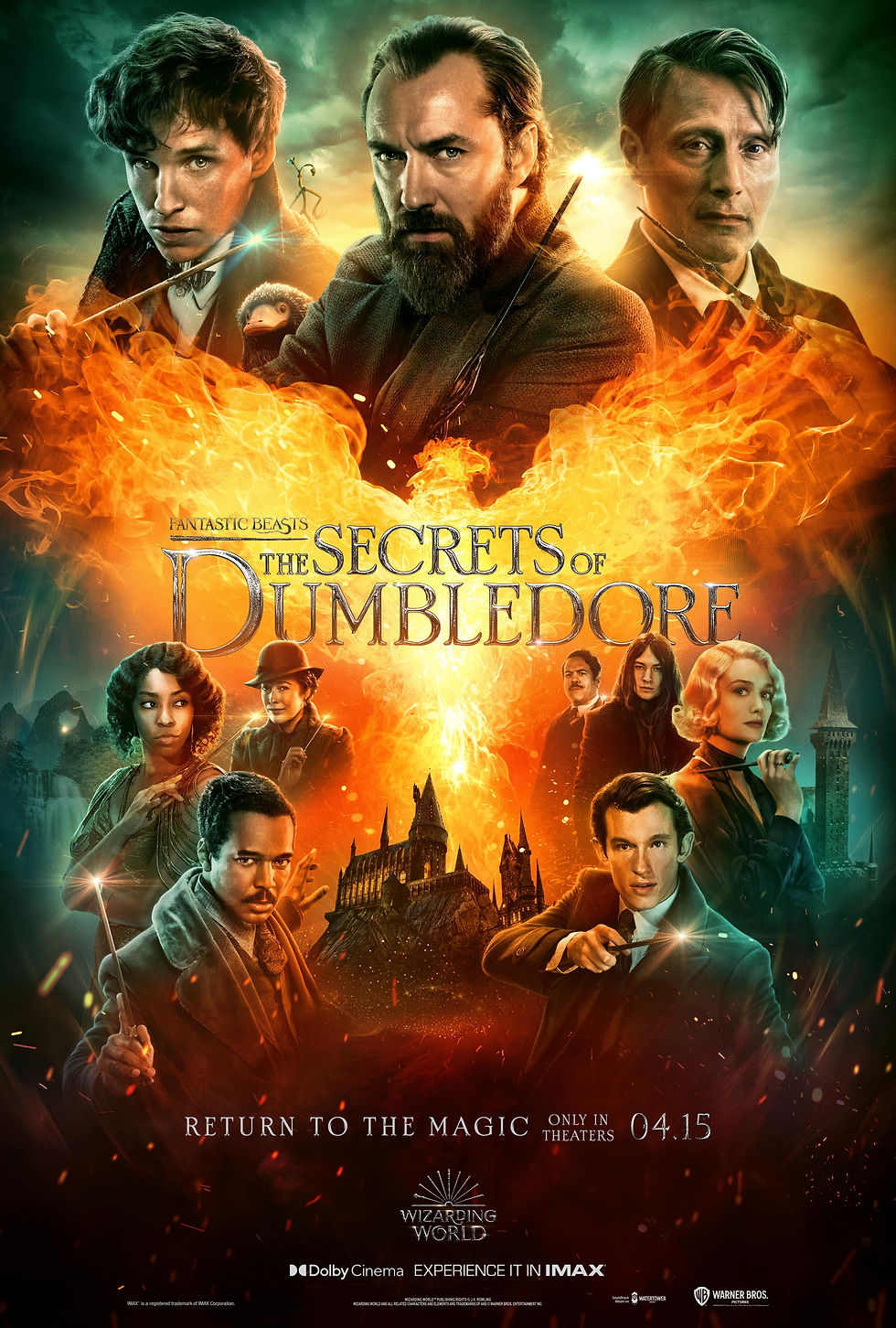Fantastic Beasts: The Secrets of Dumbledore
- Young Critic

- Apr 14, 2022
- 3 min read
The latest in the wizarding franchise corrects some mistakes, but still feels like unnecessary filler

The world of Harry Potter has proven to be incredibly lucrative for all involved, perhaps too much so. Inevitably, as Hollywood’s business model shifts towards exploiting one’s own IP, the boy-wizard and his characters was bound to be squeezed out of its perfectly enclosed story for some extra cash. This has led to spin-off videogames, plays, some in-the-works series, and most prominently up until now, a prequel film saga. The Fantastic Beasts films seek to show the first wizarding war where Potter’s mentor Albus Dumbledore first rose to fame as the hero. The first two films in the franchise struggled to set an identity and plot a course, the third out of five planned films has just arrived seeking to revise and rejigger their heading.
Fantastic Beats: The Secrets of Dumbledore (2022) is a direct follow-up to The Crimes of Grindelwald (2018). Albus Dumbledore (Jude Law) is seeking to confront his past lover and wizard fascist Gellert Gridelwald (Mads Mikkelsen), as the latter begins to scheme in wizarding politics to impose his wizard nationalist ideology that seeks to enslave all non-wizard folk whom he considers inferior. Thus, Dumbledore must employ his allies, such as the film’s hero magizoologist Newt Scamander (Eddie Redmayne), non-magic muggle Jacob Kowalski (Dan Fogler), and new face professor Eulalie Hicks (Jessica Williams) amongst others to face Grindelwald.
David Yates returns to direct, marking his seventh consecutive Potter-related film. The British director is not one for showy stylistic choices, but rather for the more underappreciated managing of clarity. The visual feel that Yates dons on The Secrets of Dumbledore is a much more patient and meditative one, that might remind viewers of Harry Potter and the Half-Blood Prince (2009) and its humble yet beautiful cinematography.
After the poor critical and financial reception to The Crimes of Grindelwald Steve Kloves, who helped adapt many of the Harry Potter films himself, was brought in to help J.K. Rowling “polish” up The Secrets of Dumbledore‘s script. This helped stop certain contradictions and over-complications that were occurring in relation to the Potter stories in the previous films. However, Kloves’ contributions have also helped establish a steadier pace, characters have been sidelined and others brought to the forefront in relation to how audiences have reacted to them, Dumbledore and Grindelwald themselves are becoming more central to the story instead of the cute, but narratively distracting magical beasts. Sadly Kloves isn’t able to solve the most glaring issues with the franchise.
The most glaring flaw with the Fantastic Beasts franchise is that much of the narrative feels like unnecessary filler, as we get side-tracked from the characters, we care about for subplots that have no effect on the story whatsoever. This is undoubtedly a problem stemming from the fact that the idea of a five-movie franchise was decided before an actual story outline was crafted. Each of the three Fantastic Beasts films so far feel jarringly lost and wandering, as if the writers were trying to buy themselves time to think about where their story is actually going. Some of the changes that The Secrets of Dumbledore has undergone to try and reposition itself favorably are extremely sloppy, especially the abrupt sidelining of what had been a main character up to this point. What’s most frustrating is that viewers are unsure what the main storyline of this franchise is, The Secrets of Dumbledore seems to be approaching the relationship and eventual conflict between Dumbledore and Grindelwald as the final answer, but it frustratingly is too afraid to dig deeper into this narrative.
The Secrets of Dumbledore most notably recasts Grindelwald, firing Johnny Depp for a court’s recognition of domestic abuse allegations, and bringing in Mads Mikkelsen. This switch is one of the best changes that The Secrets of Dumbledore performs, with Mikkelsen giving the main villain the air of a man who genuinely thinks he is doing right by his beliefs. This added complexity along with a believable chemistry between him and Law’s Dumbledore introduces the most interesting dynamic Fantastic Beasts has crafted so far. Law gets more time to shine in this film, but still isn’t able to bring a definitive take to his Dumbledore yet with his limited time. Redmayne is stable enough, but the characters that most won me over were Dan Fogler once again, whose comedic timing is a true delight, and Jessica Williams, who steps into the limelight with an ease and likeability that made her such a standout in films such as Booksmart (2019).
In the end, Fantastic Beasts: The Secrets of Dumbledore is a baby step in the right direction for the franchise, but it still struggles with developing a an identity and justifying each stand-alone movie. For now, Fantastic Beasts still looks like a shameless cash-grab, Warner Bros. has two more films to pull out some intrigue and thrill out of the hat.
5.3/10








Comments